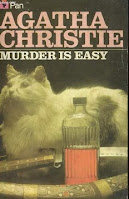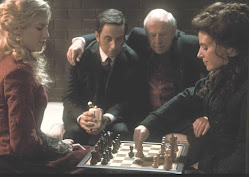The problem with mysteries on cruises and planes is that unless the mystery is tied to the cruise or plane, it really doesn't matter that it happens on a cruise or plane. It could happen anywhere.
Sometimes the mystery is tied to solving the mystery before the cruise docks or plane lands. In one episode of Bones, Booth wants to arrest the malefactor before the plane lands in China; before then, the plane is still "American soil."
Overall, however, such time crutches are not exclusive to transportation. They can be tied to dawn breaking or night falling or rain coming or a holiday beginning.
Sometimes the mystery is tied to the cruise sinking or the plane crashing. The latter is VERY COMMON (see at least one episode in every mystery show ever, including Murdoch Mysteries). The first is less plausible than the second. One reason that passengers were slow to get off the Titanic is that it is actually surprisingly difficult to sink ships absent a bomb or an iceberg that rips past ALL watertight compartments. Many ships that hit icebergs in the early twentieth century stayed afloat for several hours, long enough for everyone to be rescued.
(Note to those who fear planes: even plane crashes are statistically
rare if one considers the numbers of planes that take off and land every
day.)

Sometimes, the setting provides the "cozy" manor house option--a passenger is killed and the only suspects are the passengers in first class. Murder She Wrote provides a decent episode of this type with several hilarious "plane" moments, including a smuggled dog!
And sometimes, the mystery is tied to conditions of travel--one of the best is "Unfriendly Skies" in Season 1 of CSI: Las Vegas (see image above). The mystery is about why/how a passenger died on the plane, and the explanation is connected to conditions of going way up in the air.
Likewise, Columbo's cruise episode involves an intimate knowledge of ship procedures--so being on the ship does matter.

Still--it's hard not to ask, "Why not wait for the cruise to dock?" Even in "Unfriendly Skies," the investigation takes place AFTER the plane has landed.
Consequently, one of the most common cruise tropes is the use of the boat to smuggle something, leading to spy passengers who confront each other during the voyage. Scarecrow & Mrs King provides one of the best episodes of this type, the aptly named "Ship of Spies," which takes place on a marriage cruise. And, of course, Spy X Family's cruise ship arc!
Hey, I treat the spaceship in my
Myths Endure on Mars series like a cruise liner, and a mystery takes place on it!
However, I made sure that (1) the mystery is related to the conditions of the spaceship, both the passengers on a particular voyage and the murder attempt's method; (2) the mystery still ends on the planet.
After all, too many times, it feels like the ship or plane is simply window dressing--not that different from the train in Murder on the Orient Express. The suspects could all be in a snowbound manor or on an island...
Yup, Agatha Christie did those too!

 The imagined plan extends to the murderers' self-delusions. The groom resents his father-in-law's rejection of his completely ridiculous business proposals. The bride asks her stepmother to fetch nail polish that is already sitting on her vanity (she never bothered to check the set-up). They don't see their own arrests coming because they believe so thoroughly in their smug version of reality.
The imagined plan extends to the murderers' self-delusions. The groom resents his father-in-law's rejection of his completely ridiculous business proposals. The bride asks her stepmother to fetch nail polish that is already sitting on her vanity (she never bothered to check the set-up). They don't see their own arrests coming because they believe so thoroughly in their smug version of reality. 















































